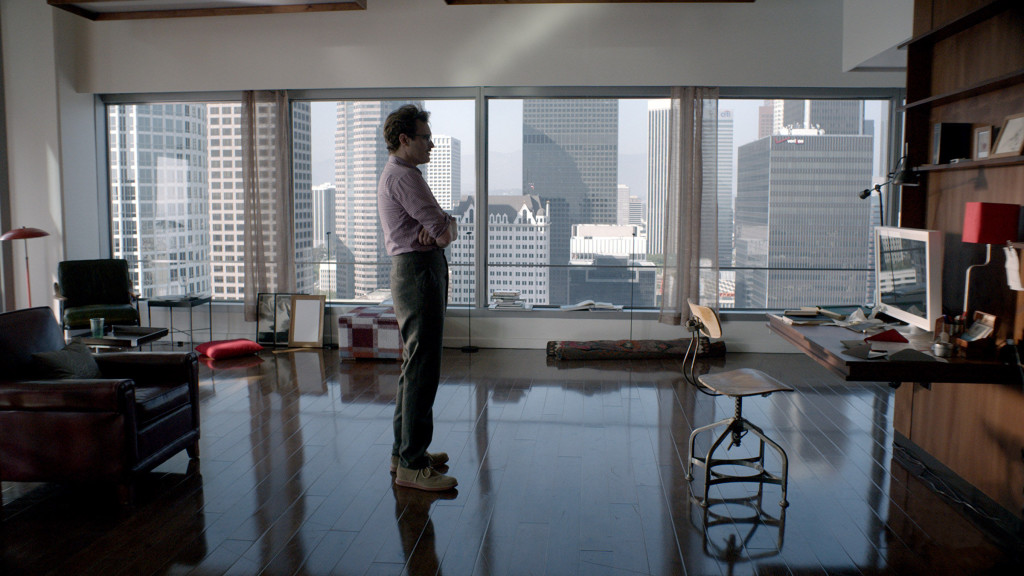Genre: Drama/Sci-fi
Premise: Set in the near future, a lonely man begins to fall in love with his artificially intelligent operating system.
About: Spike Jonze’s (director of Where The Wild Things Are and Being John Malkovich) latest! This is only his fourth directing effort in 15 years and his first as both writer and director. Columnist Mark Harris classifies Jonze’s career best when he says: “As he begins his third decade as a restless genre-hopper in the public eye, he remains one of the rare film artists who is equally respected in and out of the mainstream. He’s never been tagged a sellout, and—amazingly, given the accelerated pace of public taste and Internet mood swings—he has never not been cool.” You can read the rest of Harris’s article here.
Writer: Spike Jonze
Details: 125 minutes!
 Sequel “Him” coming to a theater near you early 2015
Sequel “Him” coming to a theater near you early 2015
I had a tough week at the movies this Christmas. I had three films I wanted to see. The first was Walter Mitty. I love coming-of-age movies wrapped inside higher concepts and this looked ambitious and imaginative from the trailer. Final verdict though? It certainly wasn’t bad, but something didn’t click. It never quite grasped what it was reaching for and the final act lost major steam.
Then there was Grudge Match. I know, I know. A lot of you pegged this as sucking brass punching bags long before I paid 10 bucks to see it but I thought it looked fun and the casting was genius. Well, wrong again Senor Reeves. This was abysmal. So boring and on the nose and PREDICTABLE. Of course, seeing as it came from the writer of “First Kid” (starring Sinbad), I shouldn’t have been surprised.
Which brings us to Her. This one had the most upside. Spike Jonze continues to be a hell of an interesting director, and like all good artists, you’re never quite sure what you’re going to get from him. The question is, what kind of “not sure” did we get? The kind we run home and tweet about, or the kind that makes us want to throw away our indie-loving Netflix Instant account?
“Her” is set in a not-too-distant Los Angeles future. Everything’s the way it is today except instead of people being obsessed with their phones 18 hours a day, they’re obsessed with them 23 hours a day. In other words, the future versions of ourselves are tuning out the real world even more than they do now.
Enter Theodore, who writes online letters for people who don’t know the difference between a metaphor and a simile (I admit to being one of these unfortunate souls), a job that allows him to exist smack dab in the middle of this reality-sucks universe. Theodore’s had a rough year. His wife left him (notated by classic indie over-exposed flashbacks of the two during happier times) and he’s still not over it, still not able to give himself to another woman.
And thennnnnn…. And then the first ever artificially intelligent operating system is introduced. This is how Theodore meets Samantha, one of those OSs. Samantha is fun, playful, and efficient, and soon begins thirsting for knowledge. But that search for knowledge quickly evolves into a thirst for Theodore! If you know what I mean.
Theodore loves it and begins to feel alive again. Not only has he fallen in love, but this is someone who can never leave him. I mean, it’s an operating system. Where is she going to go! He begins telling his friends, like depressed documentarian Amy (played by Amy Adams) and is surprised when they actually accept the relationship. But for every Facebook, there’s a Myspace, and the more Samantha learns, the more she outgrows Theodore. Will he be able to contain her and save their relationship? Or is he destined, once again, to be sad and alone???
 Ben Stiller in Walter Mitty, one of my other Christmas Week watches.
Ben Stiller in Walter Mitty, one of my other Christmas Week watches.
I loved the setup of Her. I liked Theodore. I liked that he wasn’t over-the-top lonely. He still had friends. He still did things occasionally. It wasn’t that typical amateur writer stuff where he’s an all-by-himself 24/7 super-loser.
I liked the discovery of Samantha, their burgeoning relationship, and I liked how relatable it all was. I mean I think most people under 40 have had a relationship by now that began online, and so you’ve been through those experiences, where you’re the one dating “Samantha.” Where you’re questioning how real a person or a relationship is if you’re not physically with that person. That’s what really stood out here, how familiar these experiences felt and how accessible that made the movie.
(spoilers) Unfortunately, the script takes a strange final act turn that destroys that relatability (yes, I know “relatability” is not a real world. Just roll with me). Theodore finds out Samantha is seeing 600 other guys. Umm… WHAT??? Okay, actually, you know what? This will probably be how it happens in the future when you have Artificial Intelligence able to communicate with thousands of people simultaneously. I get that. But for right now? For here in this movie? There is no real-world equivalent to your partner cheating on you with 600 other people. Unless it’s Elliot Spitzer, of course.
And I think that’s important for sci-fi scripts. No, not that Elliot Spitzer cheat on you. But that you make sure the things your characters are going through are relatable to real world people. Or else why would we be interested? How can we be invested? That, to me, is when the movie/script fell apart.
But you could see the writing on the Facebook Wall before that if you were paying attention. Phone calls are BORING to watch. Putting people face-to-face is always better because it’s more interesting to see people duke it out in person. Now there are exceptions. If the phone calls are built into the plot (in something like “The Call” which was about a 9-1-1 Call Center – obviously, phone calls will be needed there), it can work. And the phone calling is definitely a plot requirement in Her. But man, after like 20 scenes with them on the phone together? I’d had enough. It just got too repetitive.
Spike Jonze was, no doubt, aware of this, and he did his best to keep us entertained in other ways. One of the best (and creepiest) scenes was when Samantha got a surrogate woman to have sex with Theodore while she talked to him. Watching the woman come on to Theodore with Samantha’s voice, even though the woman’s lips weren’t moving, was, as Theodore put it, “really weird.”
And there were a few quirky Spike Jonze’isms that kept things fun, such as Paul, Theodore’s co-worker who really really really (like in an unhealthy way) liked Theodore’s letters. And then there was a cyber-sex scene that had Theodore’s partner (voiced by Kristin Wiig, I later found out) telling him to strangle her with her dead cat while he fucked her. A little strange, if not crowd-pleasing. But those moments couldn’t prop up a film that probably would’ve worked best as an extended short, as opposed to a 125 minute feature (125 pages for a script where your character is going to be on the phone 80% of the time?? Come on!).
I came away from this week a little confused, because I watched three sets of writers take three different approaches to their scripts. The Grudge Match writers literally copied and pasted Blake Snyder’s Save The Cat book into their Final Draft document and saved the document as “Grudge Match.” The Walter Mitty writers were a little more ambitious and went off the beaten path, yet lost momentum in their final act as a result (once your main character achieves his goal, as Walter Mitty did at the end of Act 2, it’s hard to keep us interested for another half-hour). And then there’s Her, which took a bunch of chances, and was really the antithesis to Save The Cat screenwriting. Yet without any footing underneath it, it eventually went south as well.
I’m not sure what to make of that. But I think Walter Mitty and Her were definitely more interesting movies than Grudge Match, so maybe the lesson here is to err on the side of taking chances rather than going the obvious route.
[ ] what the hell did I just watch?
[ ] wasn’t for me
[x] worth the price of admission (barely – I’d say a matinee at a cheap movie theater)
[ ] impressive
[ ] genius
What I learned: The Relatability Quotient. This is especially true with sci-fi. Keep your characters and the experiences they’re going through universal so we can relate to them. When Samantha represented our own online relationships, we identified with Theodore and cared about what happened. Once she started seeing 600 other guys, because we have no real-world equivalent for that, we began to feel disconnected from the story. How’s the Relatability Quotient in your latest screenplay?

